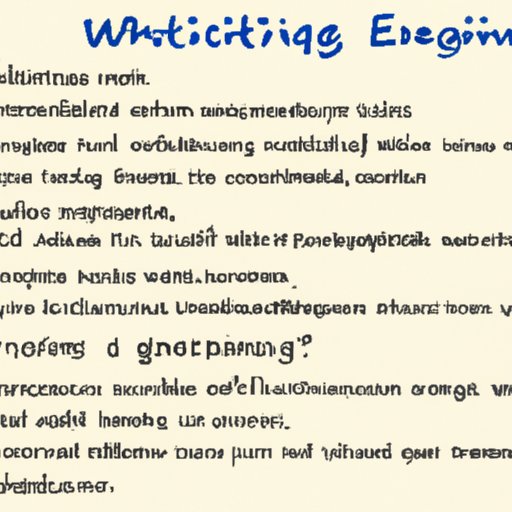Introduction
Writing is an essential skill for anyone looking to communicate their ideas in a clear and concise manner. Whether you’re writing for business, school, or personal communication, it’s important to understand the basics of effective writing. This article will provide an overview of what constitutes effective writing, as well as tips and strategies for achieving it.

Identify Your Audience and Purpose
The first step in creating effective writing is to identify who you are writing for and what your purpose is. Understanding who your audience is will help you tailor your writing style to their needs. For example, if you are writing a formal business letter, you will want to use a professional and polite tone. On the other hand, if you are writing a blog post, you may be able to use a more conversational tone.
In addition to understanding your audience, you also need to define your writing goals. What do you want to achieve with your writing? Are you trying to inform, educate, persuade, or entertain? Defining your purpose will help you create writing that meets the needs of your readers.
Develop a Plan for Writing
Once you have identified your audience and purpose, you can begin to develop a plan for writing. Outlining your thoughts is a great way to organize your ideas and ensure that you stay on track. Brainstorming is another useful tool for generating new ideas and fleshing out existing ones. Once you have a list of ideas, you can begin to organize them into a logical structure.
Choose the Right Tone and Voice
Choosing the right tone and voice for your writing is an important step in creating effective writing. The tone should be appropriate for the audience and the purpose of the writing. For example, if you are writing a persuasive essay, you may want to use a passionate and convincing tone. On the other hand, if you are writing a research paper, you may want to use a more neutral and objective tone.
In addition to tone, it’s also important to consider the “voice” of your writing. Voice refers to the personality and attitude that comes through in your writing. It can range from formal and professional to casual and conversational. When choosing the right voice for your writing, consider the audience and the purpose of the writing.
Use Clear and Concise Language
Using clear and concise language is essential for effective writing. Keep sentences short and simple, and avoid using jargon or unnecessary words. Using this approach will make your writing easier to read and understand.

Utilize Proper Grammar and Spelling
Using proper grammar and spelling is another important aspect of effective writing. Double-check your work for accuracy, and don’t be afraid to use online tools to help you with grammar and spelling. Many websites offer free spell-checkers and grammar checkers that can help you spot and correct errors.
Utilize Structural Elements
Structural elements such as headings, subheadings, and bullet points can help break up text and make it easier to read. Utilizing these elements can also help you organize your ideas in a logical way and ensure that your readers can easily follow your train of thought.

Edit and Revise Before Publishing
The final step in creating effective writing is to edit and revise before you publish. Read through your work multiple times and ask for feedback from peers. This will help you spot any errors or areas that could be improved. Taking the time to edit and revise your work is an important part of the writing process.
Conclusion
Effective writing requires careful planning and attention to detail. By following the tips outlined in this article, you can create writing that is clear, concise, and tailored to your audience. Identifying your audience and purpose, developing a plan for writing, choosing the right tone and voice, utilizing proper grammar and spelling, utilizing structural elements, and editing and revising before publishing are all key elements of effective writing.
With practice and dedication, you can hone your writing skills and create content that resonates with your readers. Start putting these tips into practice today, and watch your writing improve.
(Note: Is this article not meeting your expectations? Do you have knowledge or insights to share? Unlock new opportunities and expand your reach by joining our authors team. Click Registration to join us and share your expertise with our readers.)
